At the ancient Egypt exhibition Ⅱ
Woman’s feelings that will never change for necklaces
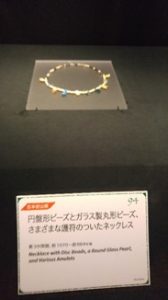 |
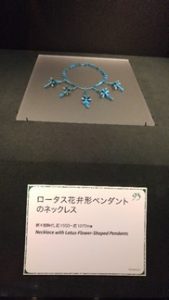 |
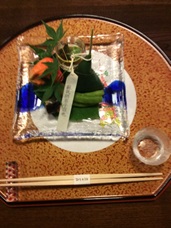 |
Approximately 3,000 years old necklace with disc-shaped beads and glass bead amulets (right)
3500 year old necklace of lotus petal pendant (left)
The photo on the right is the Somin Shourai’s Ofuda, which was eaten at Hotel Okura Awata Sanso’s July appetizer.
At the Egyptian Kyoto exhibition that ended on June 27, an impressive exhibit was a necklace 4000 years ago. The two necklaces, worn on a daily basis, are protective amulets consisting of goddesses, cats and pomegranate flowers. It was also placed in a casket for the dead, so it seems that it also watched over the dead. Since it was worn on a daily basis, it has been excavated from both the of the residence ruins and the grave.
Many ornaments have been excavated in ancient Egypt because they were buried in tombs, but women’s longing for ornaments seems to be eternal. The necklace that they wear on a daily basis may have meant something like a talisman.
In Kyoto, it is customary to attach a bill written by Somin Shourai of Yasaka Shrine, which is said to have the roots of amulets, to the cooking utensils, and it is often seen on the plates of restaurants in July. For residents living in Kyoto, July is the month of the pike conger month and the Gion Festival.
There were no Gion Matsuri and Yamahoko floats this year, and the festival was held with a limited number of people on foot. The amulets of Yasaka Shrine are said to have the roots of amulets. When Susanowonomikoto of Yasaka Shrine traveled to the Nankai in the Bingo Koku Fudoki Ibun, which was created in the Nara period, the invitation of the Somin Shourai made a statement, and Natsukoshi passed through the ring of Kaya while chanting “being a descendant of the invitation of the Somin Shourai”. Like the Harae, the tradition of being protected is also inherited in Kyoto.
It is said that wearing a talisman on the waist will not cause illness, and it seems that the tree has been cut into octagons and given. It is worshiped as a god who brings good fortune, excluding plagues and disasters. The awarding of Chimaki (rice dumplings) at the Gion Festival has begun this year as well.
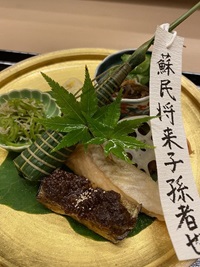 |
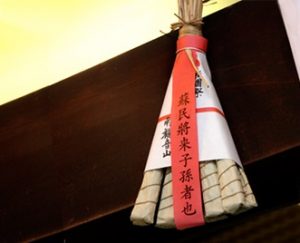 |
